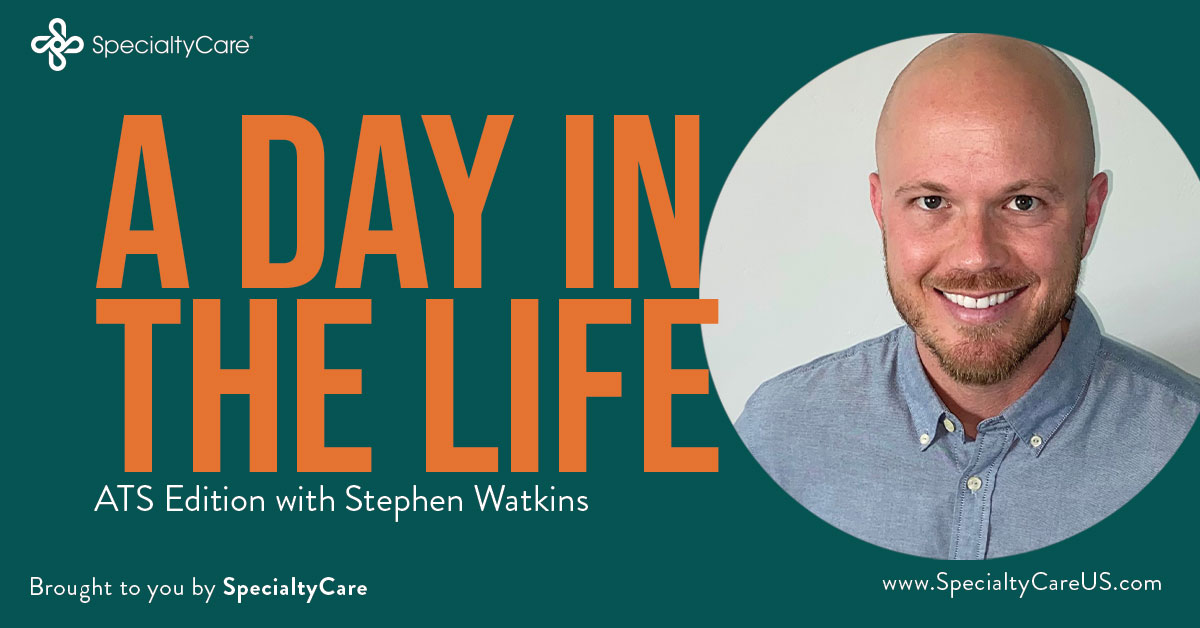We greatly appreciate and value all of our SpecialtyCare ATS employees. This week, we’re highlighting one of our Clinical Managers, Stephen Watkins, whose work upholds our mission and vision. He discusses what led him to healthcare and what a typical day in his role looks like while sharing valuable advice and memorable moments from his career.
How long have you been an Autotransfusion Clinical Technician?
I’m in my twelfth year with SpecialtyCare, all of which I’ve spent on the Salt Lake City ATS team. I also participate in several company committees and groups relating to ATS services.
What led you to become interested in ATS, and can you describe the path you took to become an ATS Clinical Manager?
I was always interested in healthcare and started as an orderly in the OR of an active SpecialtyCare account. I got to know the team and service and took advantage of someone referring me to SpecialtyCare management for a part-time position. I was part-time for a few months before transitioning to full-time. Through the years, I became more involved in the quality and administrative side of the business and moved into a supervisory role before becoming a clinical manager.
What are the benefits of a career in ATS?
The primary benefits are providing a valuable clinical service to patients, offering efficient solutions to our hospital partners, and having a flexible work-life balance. As a manager, I enjoy the mix of clinical and administrative work.
What is a day in the life of an Autotransfusion Clinical Technician typically like?
Our team’s day begins on the previous day by assessing the schedule and assignment to plan. Then, I wake up, arrive early, provide the best clinical service possible, pick up a call shift, snack on my way home, sleep (hopefully), and repeat. Daily assignments can range from call days to 18-hour clinical shifts, including everything in between.
Providing and managing this service for a while, I’ve realized that the job picks you. Daily life necessitates flexibility and reliability. It takes unique individuals to thrive in the uncertainties of the work and to manage the emotional, mental, and lifestyle flexibility that it often requires. Shout out to our incredible group in Utah and Idaho that hit all the marks!
What communication advice would you give when working successfully in a team dynamic?
An essential aspect of this career is that every move you make and every communication represents you, your team, and SpecialtyCare — for better or for worse. The team dynamic extends beyond your fellow SpecialtyCare associates to hospital management and staff, surgeons, and patients. The best advice I can give is to listen, pause, respond instead of reacting, and maintain your integrity. These qualities build trust and understanding, which are critical in any team dynamic.
What was a surprise to you about the career when you first started?
The biggest surprise was the flexibility. Moving from a regular 9-5 job was a lifestyle and culture shock. It wasn’t only an adjustment for me, but for my family, too.
What has been a memorable moment or story you’d like to share from your career?
The role of a clinical technician isn’t always exciting, but challenging moments are often critically important to the patient’s wellbeing. An echoing memory for me, and many techs that I’ve worked with, is when a surgeon or anesthesiologist approaches you after a complex and stressful case and thanks you for helping save a life.
About SpecialtyCare
SpecialtyCare is dedicated to providing an exceptional patient experience, becoming the OR employer of choice, and leading the way in OR innovation.
